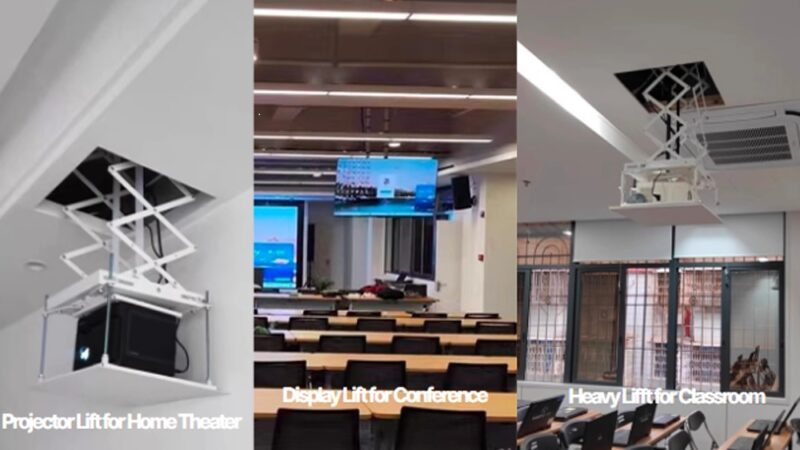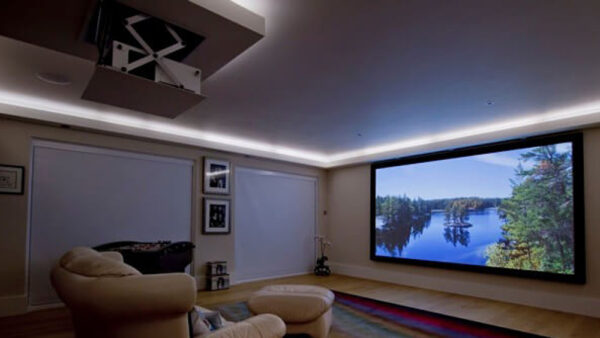How to Choose the Right Electric Projector Lift?
Choosing the right projector lift can be tricky. The best electric projector lift depends on your space size, budget, and specific needs. Measure your ceiling height, check load capacity, and ensure it fits your setup—whether for a classroom, theater, or conference room. A well-matched lift improves performance and longevity.
Pick an electric projector lift by checking your room size, budget, and key features like load capacity1. Match it to your scenario—meeting room, theater, or classroom.

Choosing the right lift
Keep reading. I’ll share practical tips from my experience at Smartavtek to match your setup perfectly.
Does Your Space Size Matter for an Electric Projector Lift?
Space size plays a crucial role when choosing a projector lift. A small room might require a compact lift, while larger spaces need heavy-duty ones to handle bigger projectors. Measuring your ceiling height and available space will help you make the right choice.

Lift for small spaces
Digging Into Space Considerations
Over the years, I’ve seen many customers at Smartavtek struggle with this. It’s not just about room size—ceiling type and layout also matter. A low ceiling in a classroom might require a short-drop lift, while a theater with high beams will need a long-reach model.
Here’s a quick guide:
| Space Type | Ceiling Height | Best Lift Type |
|---|---|---|
| Small Meeting Room | Under 8 ft | Compact, shallow-drop |
| Classroom | 8-10 ft | Adjustable, medium-drop |
| Theatre | Over 12 ft | Heavy-duty, long-drop |
Projector weight is another factor. A client in Brazil once picked a lift that couldn’t support their 15 kg projector, and it failed within weeks. Always check the weight capacity of the lift and your room’s power setup—some models require additional wiring. Measuring everything in advance will save you from costly mistakes.
How Does Budget Affect Your Projector Lift Choice?
Projector lifts range from $200 for basic models to over $1000 for high-end versions. Cheaper options might lack durability, while expensive ones can strain your budget. The key is to find a balance between quality and cost.

Affordable lift options
Exploring Budget Options
I’ve worked with wholesalers and engineers at Smartavtek, and I’ve learned that budget isn’t just about price—it’s about long-term value. A $300 lift might work for a small classroom, but a theater requires something more durable. Many mid-range options around $500 offer the best balance of reliability and affordability.
Here’s a breakdown:
| Budget Range | Features | Best For |
|---|---|---|
| $200-$400 | Basic motorized, light load | Small rooms, startups |
| $400-$700 | Adjustable, medium load | Classrooms, offices |
| $700-$1000+ | Heavy-duty, silent motor | Theaters, big venues |
Maintenance costs should also be considered. Cheap lifts may require frequent repairs, increasing expenses over time. A mid-range lift I recommended to a client in Vietnam has been running smoothly for over three years. Always check load capacity1 and motor lifespan, and ask suppliers about warranties—it can be a lifesaver.
What Features Should You Prioritize in a Lift?
With so many options available, it’s easy to get overwhelmed. The key factors to focus on are load capacity1, drop distance2, and noise level. Your lift should be strong enough to hold your projector, fit your space, and operate quietly.

Top lift features
Breaking Down Must-Have Features
After years of working with Smartavtek customers, I’ve found that certain features make all the difference. Load capacity is the top priority—your lift must be able to support your projector’s weight. Drop distance should match your ceiling height, and noise level is crucial in quiet environments like meeting rooms.
Here’s what to look for:
| Feature | Why It Matters | My Tip |
|---|---|---|
| Load Capacity | Holds projector safely | Add 5 kg buffer |
| Drop Distance | Fits ceiling-to-screen gap | Measure your space |
| Noise Level | Keeps presentations smooth | Aim for under 30 dB |
A client in India recently opted for a silent lift in their boardroom. It cost more, but the positive feedback from employees made it worth it. Remote control functionality is another useful feature—test different models if possible to find the best fit for your needs.
How Do Scenarios Like Classrooms or Theaters Change Your Choice?
The ideal projector lift varies depending on where it will be used. Classrooms require flexibility, theaters need heavy-duty lifts, and meeting rooms benefit from compact, quiet models.

Scenario-based lifts
Matching Lifts to Scenarios
I’ve supplied projector lifts to customers across Southeast Asia and Europe, and I’ve learned that different environments have specific requirements. Classrooms often change projectors frequently, so adjustable lifts work best. Theaters require lifts that can support over 20 kg, while meeting rooms need quick and quiet solutions.
Here’s a guide:
| Scenario | Key Need | Lift Type |
|---|---|---|
| Classroom | Flexibility, light load | Adjustable, 10-15 kg |
| Theater | Power, long drop | Heavy-duty, 20 kg+ |
| Meeting Room | Speed, quiet operation | Compact, silent motor |
A client in Pakistan needed a lift for a theater, and we tested its load capacity beforehand—it was a crucial step. Installation is another factor to consider. Theaters often require professional setup, while classrooms may allow for a DIY approach. Always consult your supplier for installation tips to avoid unexpected issues.
Conclusion
Choosing the right electric projector lift depends on your space, budget, key features, and specific needs. By considering these factors carefully, you can find the perfect lift to enhance your presentations and viewing experiences.

